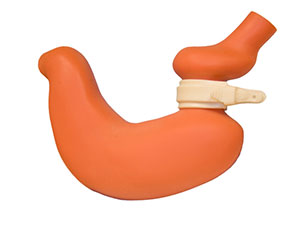With the UK’s growing obesity crisis, many Brits are turning to costly weight loss surgery, but how effective is it?
Gastric bands, gastric bypasses and gastric balloons – to name the most commonly performed procedures – appear to offer a solution to the problem of obesity by physically restricting the amount you can eat. Morbidly obese patients can expect to lose 50% of their weight in just two years.
But bariatric surgery doesn’t come cheap – it costs the NHS around £7,000 for a gastric band procedure and aftercare. (What’s more, it rarely comes with counselling to address the psychological reasons why people overeat.) As a result, not everyone who wants – or believes they need – this type of surgery can get it for free.
The best solution?
‘For people who have tried all other methods of losing weight without success, and whose weight is now a risk to their life because of complications such as diabetes, there’s evidence that having bariatric surgery is a worthwhile intervention,’ says Dr Gill Jenkins, a GP in Bristol with a special interest in weight-management issues. ‘It will help you lose weight. But, in my view, it would be much better if the NHS offered people a VLCD and weight-loss counselling before offering surgery.’
Many people choose LighterLife so they can slim down to a safe enough level to have bariatric surgery. However, they often find their weight loss so quick and sustainable with the programme, they decide against going under the knife.
Major risks
While many might consider it the only way, bariatric surgery is not quite the quick fix that it first appears. Like all surgery, it has risks, which include:
- Obese people are more likely to have problems waking up from the anaesthetic, and are also at greater risk of post-surgery respiratory problems and blood clots
- You can get an infection, suffer internal bleeding or one of your other organs, such as your liver, might be damaged.
- In the long term, other things might go wrong: a gastric band, for example, could slip or erode into the stomach. Although fatalities and major complications are rare, one in 20 patients having a gastric band suffers a problem that requires further surgery or deflation of the band.
But even if you make it through the operation smoothly, weight loss isn’t guaranteed. As Dr Jenkins says, reducing the size of your stomach doesn’t change the way you think about food. ‘Bariatric surgery won’t deal with your desire to overeat,’ she explains. ‘It won’t change your psychology or your attitude to food; it will just make you feel full more quickly.’
Bariatric surgery isn’t suitable for everyone. If you’re the type of person who snacks or grazes on food all day, you’ll still be able to do this after surgery – so you won’t necessarily lose weight. Bariatric surgery is most effective in people who eat huge portions and eat them too fast; you simply won’t be able to do this afterwards (or if you try, you’ll suffer unpleasant side-effects like vomiting).
Cheating tactics
And if you’re not committed to eating healthy foods after surgery, you won’t see weight-loss results.
Having surgery doesn’t change your choice of food, just the way you eat it. It makes you eat smaller portions, eat more slowly and chew more carefully. And, unfortunately, many high-calorie foods, such as ice cream or chocolate, slip down very easily.
‘I’ve had patients cheat by pureeing their favourite foods after surgery so they can keep eating them,’ says Dr Jenkins. ‘Then they wonder why they aren’t losing weight.’
So, if you want to lose weight after surgery, you will still have to learn to eat more healthily and to exercise. That’s why reputable surgeons work with counsellors and dieticians, and offer pre-counselling and long-term aftercare. Some argue that if you have to learn to enjoy a healthier lifestyle after surgery, why can’t you forgo the surgery – saving the NHS the cost – and simply lose weight through healthy eating and exercise in the first place?


